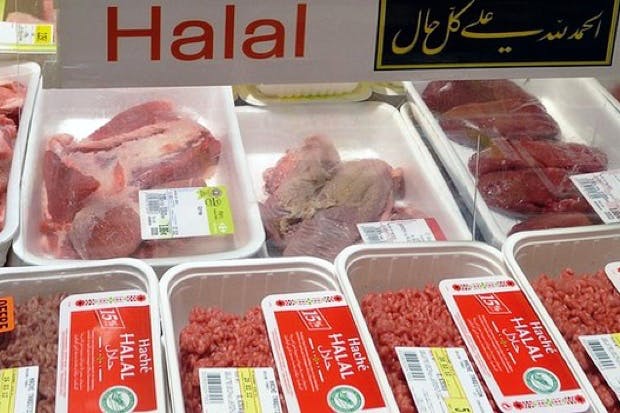We have to talk about the schoolgirl who was disqualified from a GCSE exam on the grounds that she had made ‘obscene racial comments’ about Islam. This bizarre incident is being chalked up to overzealous wokeness on the part of some GCSE examiners. But it’s more than that. It tells us a bigger story about 21st-century Britain and the creeping criminalisation of any questioning of Islam. Too many institutions now believe it is their role to monitor and even punish anti-Islam ‘blasphemy’.
The girl — Abigail Ward — is 16 years old and a strict vegetarian. In her GCSE Religious Studies exam she wrote some critical comments about halal meat. She described the butchery involved in the preparation of halal meat as ‘absolutely disgusting’. The exam board OCR accused her of having made ‘obscene racial comments’ and disqualified her exam paper. Her school appealed, and won. OCR apologised for the ‘upset and stress’ it had caused Miss Ward.
But before we move on and shrug off this incident as the behaviour of an ‘overzealous, over-righteous’ examiner — as Miss Ward’s mother put it — we have to ask some questions. Primarily this one: why on earth was criticism of an Islamic practice presumed to be racist? And not only racist but obscenely racist?
As Miss Ward’s school pointed out in its appeal, she had only expressed disgust at halal butchers, not at Muslims more broadly, far less at non-white people. Nothing in her exam answers could be construed as racist, the school said in its appeal, and OCR eventually accepted this.
To demonise a 16-year-old girl as obscenely racist simply because she criticised a religious practice is pretty mad and immoral behaviour. But at the same time it feels familiar. It is in keeping with the broader woke taboo on criticising Islam. Today it is frequently assumed — by sections of the political class, by the educational establishment, by the commentariat — that anyone who feels uncomfortable with Islam and its beliefs and practices must be driven by a racial animus towards Muslims more broadly.
Consider the media fury that enveloped Boris Johnson when he called the niqab an oppressive and ridiculous garment. He said not a single racist thing in his niqab-questioning newspaper column. In fact he defended the right of women to wear this archaic garment. And yet he was swiftly denounced as a far-right bigot.
Or consider when Ofsted was denounced by 1,000 educationalists and faith leaders as ‘institutionally racist’ when it suggested its inspectors should raise questions if very young girls, of four or five years of age, are wearing the hijab to school. Again, criticism of an Islamic practice — and entirely legitimate criticism, too, given that covering very young girls in the hijab could have the unwitting effect of sexualising them — was denounced as racial bigotry.
Or consider the latest report from the Muslim Council of Britain. It criticised Joanna Lumley for saying in a TV documentary that Kyrgyzstan has a ‘less strict Islamic feel’ than other Muslim nations; TV drama The Bodyguard for featuring a character in a hijab who comes across as oppressed and subservient; and the BBC for giving a ‘one-sided view on the hijab’ by interviewing one of the Iranian women who protested against compulsory hijab-wearing. What was the BBC meant to do — ask the theocratic rulers of Iran for their opposing opinion? This is bizarre.
Again and again, all sorts of perfectly legitimate commentary on Islam is collapsed under the headings ‘prejudice’ or ‘bigotry’ or ‘racism’. And the political class actively stirs up this censorious, chilling approach to all things Islamic.
The definition of Islamophobia put forward by the All-Party Parliamentary Group on Muslims describes this phobia as being ‘rooted in racism’ and says it is ‘a type of racism that targets expressions of Muslimness or perceived Muslimness’. It has been adopted by Labour, the Lib Dems, City Hall and numerous local councils.
This is a really worrying definition. It is sufficiently vague that any strong-worded criticism of ‘expressions of Muslimness’ — for example the niqab or certain Koranic beliefs — could be construed as being ‘rooted in racism’. Should we really be surprised that school examiners are denouncing schoolgirls who criticise Islamic practices as obscenely racist when we live under a political elite that seems determined to rebrand questioning of Islam as a ‘type of racism’?
No one benefits from the demonisation of criticism of Islam. It hurts free speech, it chills public debate, and it’s bad for Muslims too.
There is unquestionably a problem of anti-Muslim bigotry today. But tackling such bigotry becomes more difficult in the current rush to brand every Islamo-sceptical utterance as an act of racism. We have to distinguish between genuine anti-Muslim bigotry and perfectly legitimate questioning or ridicule of Islam, in order that we might defend freedom speech and confront genuine prejudice against Muslims.







Comments